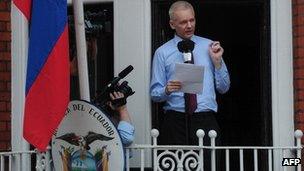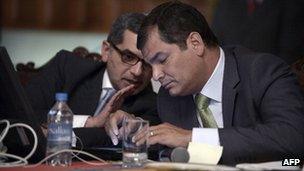Viewpoint: A risky Ecuador-Assange alliance
- Published

Julian Assange cannot leave Ecuador's embassy
Ecuador has garnered support for its right to offer asylum to Julian Assange. But the victory for both Mr Assange and his host nation could be bittersweet.
Ecuador partied at the Organisation of American States (OAS) on Friday at the expense of Britain and the United States. But after all the rhetorical confetti settles, President Rafael Correa and his new best friend, Julian Assange, face a lengthy diplomatic hangover.
London and Washington may be content to let the unlikely pair suffer in the small bed they have made or, more accurately, inflated.
At the end of the day, the OAS, the regional organisation for North, Central and South America, passed a resolution that encouraged Ecuador and the UK to come to a peaceful agreement over Julian Assange's current residency at the Ecuadorean embassy in London.
Thirty-three of the 34 member states voted to support the motion, put forth by Ecuador, expressing solidarity for Ecuador's rights and underscoring the inviolability of foreign embassies. (Canada, not the US, was the lone holdout.) The final motion was revised from the original to exclude language describing the UK's actions as a threat to Ecuadorean embassy.
Still, the emergency OAS meeting provided an irresistible opportunity for Ecuador to tweak Britain over perceived diplomatic threats that may or may not have been made and the United States over an extradition of Mr Assange that may but probably will never occur. A number of hemispheric neighbours were happy to pile on.
But this faux row involves a healthy dose of hypocrisy.
Diminished prospects
While invoking the sanctity of diplomatic protocols, less was said about the rule of law. Mr Assange sought asylum from Ecuador to avoid being extradited from the United Kingdom to Sweden, where he is wanted for questioning on sexual assault allegations. He has exhausted his available legal appeals.
In remarks last Saturday from the balcony of the Ecuadorean embassy in London, Mr Assange saluted Ecuador for "taking a courageous stand for justice" without ever mentioning justice delayed indefinitely for two women in Stockholm.
Conjuring up an image of "an oppressive world, in which journalists fall silent under the fear of prosecution," he skipped over the fact that his host has practiced just such media intimidation against some political foes since coming to office in 2007.
While it is true that the US Department of Justice continues an investigation that presumably includes Mr Assange, it likely will not indict him for the 2010 compromise of classified US documents.
It is impossible to distinguish Mr Assange's actions from those of the mainstream media, including venerable outlets like The New York Times. The Obama administration undoubtedly recognises that prospective global reputational risk which is why it has concentrated on the prosecution of the alleged sender, Private First Class Bradley Manning, rather than the receivers.
Give Mr Assange credit. He is a one hit wonder, but has milked it for all it's worth. He has achieved his 15 minutes of fame - and then some.
But now his prospects are diminishing rapidly. The very notoriety he has sought and achieved through Wikileaks now works to the disadvantage of his creation.
Mr Assange loves to blame the United States for his troubles. But Wikileaks' struggles are far more the result of internal dysfunction (and Mr Assange's behaviour) than an external conspiracy.
Information yearning to be free, not to mention informers yearning to remain anonymous, are increasingly likely to be spooked by all the attention on Mr Assange.
Messy resolution
Having been victimised by Wikileaks, there is a certain irony to President Correa's defence of the site's leader. Mr Correa evidently took offence at the "imperialist" tone of cables written about him by the former US ambassador to Quito.
His is not an embrace of Mr Assange, according to Haverford College professor Anita Isaacs, so much as an opportunity to "settle old scores with the United States".
Standing up to the United States won't hurt his reelection prospects in 2013 either.
While Mr Correa may wish to succeed Venezuelan President Hugo Chavez as the region's tormenter-in-chief of the US, the Ecuadorean economy is heavily dependent on US markets.
Inevitably, Ecuador will seek to resolve the Assange matter. He will certainly wear out his welcome in Knightsbridge. But the country's public grandstanding will make a quick resolution very difficult.
Britain has rightly worked to lower the temperature in recent days.

Ecuador President Rafael Correa (right) appealed to the OAS earlier this week
But having surrounded the Ecuadorean embassy, it is now committed to enforcing Sweden's extradition request. When Mr Assange finally leaves the embassy, he'll be heading for Stockholm, not Quito.
While trying to avoid a legal extradition he contested and lost, Julian Assange has instead imprisoned himself on an air mattress in a small room in an embassy with few creature comforts, certainly a step down from Ellington Hall where he was previously under house arrest.
War is hell, even one that exists principally in his own mind.
How long can this go on? Prior to the OAS meeting, unnamed Ecuadorean officials said as long as it takes: perhaps eight years, perhaps two centuries.
Be careful what you wish for.
PJ Crowley is a former US assistant secretary of state and now a fellow at the Institute for Public Diplomacy and Global Communication at The George Washington University.
- Published24 August 2012
- Published18 August 2012
- Published21 August 2012